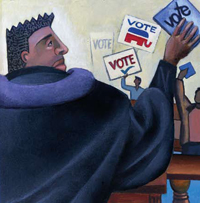“Because none of these factors remains stable over time, the level of political activism of churches remains in flux,” McDaniel explains. “Ultimately, the level of political activity undertaken by a church is a function of its pastor, members, organization and environment.”
McDaniel also is interested in how external mobilization efforts affect black church activism. As he observed the rise of the “religious right” in the 1990s, he wondered where the black church fit in the equation.
“Recent scholarship has focused on the movement of white examine this phenomenon and evangelicals into the republican Party during the 1980s.
But why hasn’t the GOP been successful in recruiting black Evangelicals?” McDaniel asks.
McDaniel and Christopher Ellison, the Elsie and Stanley Adams Centennial Professor of Scoiology, tackled this question in their study, “God’s Party? Race, Relgiion, and Partisanship Over Time,” which appeared in Political Research Quarterly.
Ellison is a leading researcher on the role of religious institutions among minority populations and how religious affiliation affects public policy preferences. Thomas Scientific/ISI recently named him in the top 250 highly cited researchers in the nation for the social sciences category.
Ellison and McDaniel drew upon data from the Houston Area Survey (HAS), a phone survey conducted by Rice University in Harris County from 1983 to 2003. The HAS offers a unique dataset due to its examination of Anglos, Blacks, Latinos, and Partisanship over a significant period of time, Ellison explains.
“The Republican Party has aggressively attempted to recruit Black and Latino evangelicals, but they’ve had limited success,” Ellison says. “We wanted to examine this phenomenon and how religious conservatism has shaped Anglo, Latino, and Black partisanship during hte past two decades.
“We found religious affiliation is a much more important predictor of voting patterns than economic status. However, it is not more important than race. Race is the big moderating factor in terms of how an individuals faith affects his of her voting patterns and party identification.”
McDaniel further explains how this finding plays out in the African-American community.
“For African Americans, race has a much stronger influence on political attitudes than religious beliefs,” McDaniel says. “In other words, African Americans were born black before they were born-again.”
*The names have been changed to protet the identities of the church and its members.
